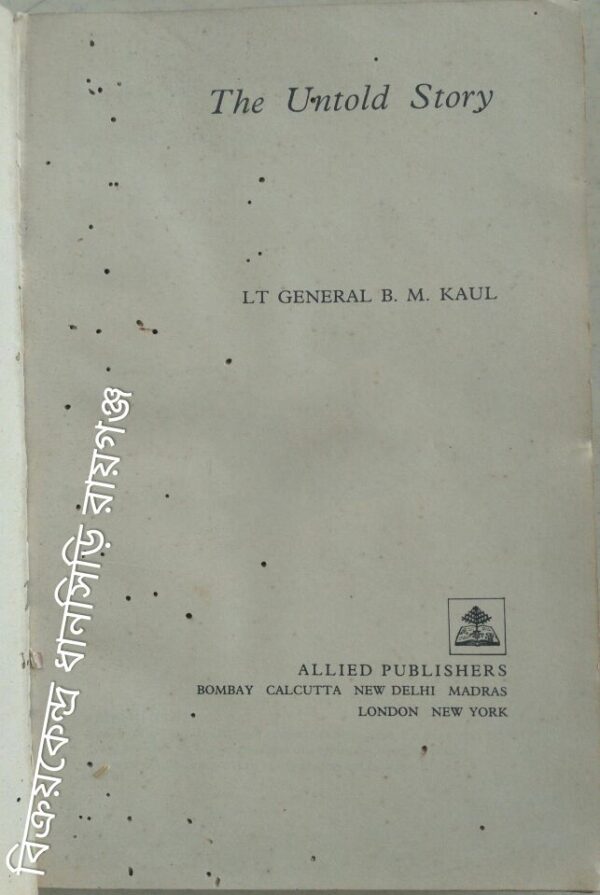The Untold Story

About
Summary
Exquisite
TOC
Details
Related
URL
Images
Overview
The Untold Story by Lt. Gen. B.M. Kaul, published in 1967, is a significant autobiographical account that provides an insider's perspective on the Indian Army's experiences during the 1962 Sino-Indian War. As a senior military officer who played a crucial role in the conflict, Kaul's narrative sheds light on the political and military dynamics of the time, as well as his personal journey through these tumultuous events.
The book is structured as a memoir, detailing Kaul's early life, military career, and the events leading up to and during the Sino-Indian War. It begins with his formative years, including his education and early influences that shaped his military aspirations. Kaul recounts his experiences at prestigious military academies and his rise through the ranks of the Indian Army.
The narrative takes a critical turn as it delves into the 1962 war between India and China, a conflict that exposed significant flaws in India's military preparedness and strategic planning. Kaul discusses his role as the General Officer Commanding (GOC) of the 4 Corps during this period, detailing the challenges faced by Indian forces in the Himalayan region.
Throughout the memoir, Kaul reflects on various aspects of leadership, decision-making, and the impact of political considerations on military operations. His candid observations about the failures of higher command and political leaders, including Prime Minister Jawaharlal Nehru and Defence Minister Krishna Menon, provide a controversial perspective on the war's outcome.
Importance of Book
Historical Insight: It provides valuable insights into a pivotal moment in Indian history—the 1962 Sino-Indian War—offering perspectives that are often overlooked in official accounts.
Military Education: The book serves as an educational resource for military professionals and scholars interested in understanding leadership challenges during wartime.
Public Discourse: By addressing controversial topics related to political leadership during the war, Kaul contributes to public discourse on accountability in governance and military affairs.
Key Themes
Military Leadership and Accountability: A central theme in "The Untold Story" is the examination of military leadership during crises. Kaul discusses the importance of accountability among commanders and critiques the decisions made by senior officials that contributed to India's defeat.
Political Influence on Military Operations: The memoir highlights how political considerations often overshadowed military strategy, leading to inadequate preparation and response during the war. Kaul emphasizes the need for a clear separation between military command and political interference.
Personal Reflection: Kaul's narrative is not just about military events; it also includes personal reflections on his experiences, emotions, and struggles as a leader facing adversity. This introspective approach adds depth to his account.
Lessons Learned: The book serves as a cautionary tale about the consequences of complacency and poor planning in national defense. Kaul articulates lessons learned from the war that remain relevant for contemporary military strategy.
National Identity and Security: The memoir touches upon themes of national identity and security, examining how external threats can shape a nation's self-perception and policy decisions.
Cultural Significance
The cultural significance of "The Untold Story" lies in its exploration of national pride, identity, and security within the context of post-colonial India. The narrative resonates with readers who seek to understand how historical events have shaped contemporary Indian society. Additionally, it reflects broader themes of resilience and adaptation in response to external challenges.
Effects on Society
Awareness of Military Issues: The book raised awareness about military preparedness and strategic planning among policymakers and citizens alike.
Critique of Leadership: It sparked discussions about accountability among political leaders regarding national security decisions, prompting calls for reforms in defense policy.
Influence on Military Discourse: The memoir has influenced subsequent generations of military leaders by providing insights into effective leadership practices during crises.
Conclusion
The Untold Story by Lt. Gen. B.M. Kaul is a compelling memoir that offers an insider's perspective on one of India's most challenging military conflicts. Through his candid reflections on leadership, accountability, and political influence, Kaul provides valuable lessons that continue to resonate today.
As readers engage with this work, they are invited to reflect not only on historical events but also on contemporary issues related to national security and governance. The memoir serves as both a historical document and a personal narrative that enriches our understanding of India's military history while contributing to ongoing discussions about leadership in times of crisis.
Overall, The Untold Story stands as an essential contribution to literature on military history in India, offering insights that are both timely and timeless for anyone interested in understanding the complexities of defense policy and national security in a rapidly changing world.
Title
The Untold Story
Author
Lt Gen B M Kaul
Name of Publisher
Allied Publishers India
Publish Date
1967
Subject
It is a critical account of the Indo-Pakistan War of 1965, offering a firsthand perspective from a key military leader involved in the conflict
Vintage
1948-2000
Edition
First
Category
History
Sub Category
Military
Rarity
RARE
